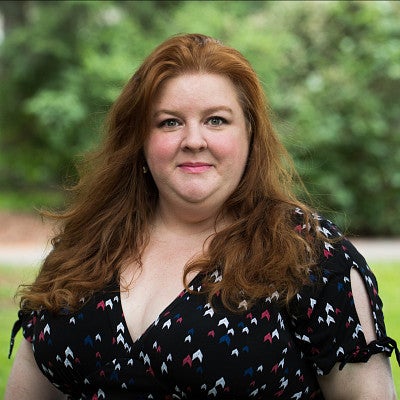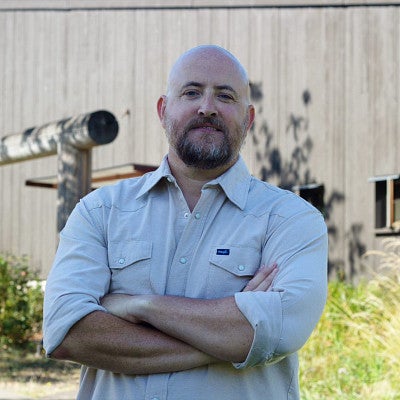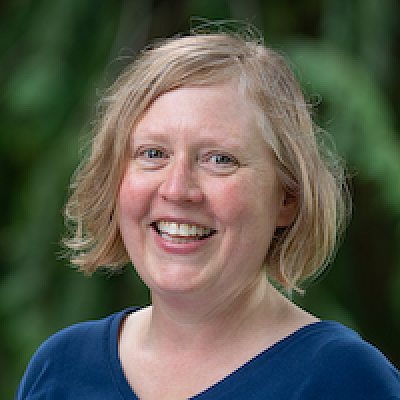Each year, the University of Oregon recognizes a select group of faculty for excellence in teaching. The Distinguished Teaching Awards committee expects to award one Herman Award for Faculty Achievement and one Ersted Award for Distinguished Teaching each year. As many as seven additional faculty members may be recognized for Specialized Pedagogy or Outstanding Online Education.
JOCELYN HOLLANDER
ALEX ZUNTERSTEIN
ROBIN HOPKINS
TANNAZ FARSI

Faith Barter
ERSTED AWARD FOR DISTINGUISHED TEACHING
Assistant Professor of English
What does it mean for you to receive this award?
This award means more to me than any of my publications or other awards, not only because of how deeply I care about teaching but because it speaks to the strong demand among students for humanities/literature instruction, and especially for content in Black Studies, racial justice, and racial history. In a moment where those things are under threat in lots of ways around the country, this award is especially meaningful.
What key aspects of your teaching would you like to highlight?
As a scholar of African American literature and legal history, I design each of my courses to be Black-centered spaces that honor students as innovators, creators, and colleagues while helping them sharpen their critical thinking and analytical skills. In practice, this means that I give them space to demonstrate their knowledge and engagement in a range of ways (some examples include: a playlist, a Supreme Court dissent, a close reading, a creative project, a formal essay, a reflection paper, and more), while also giving them rigorous individual feedback. I try to help students reframe their relationship to feedback as investment in their ideas rather than as judgment about their abilities; we have many conversations about what it means to receive and offer feedback, how scholarship is impossible without feedback, how working with discomfort can produce magic, and how to replicate practices that feel productive for them after they leave my classroom. We work within an ethic of Black-centered and specifically Black Feminist principles, and/but one of my goals is for students to take the thinking, writing, and analytical skills that we practice into other spaces -- I hope that they leave my class better prepared to express themselves, to have difficult conversations, and to be thoughtful cultural critics in any setting, on any topic.
What resources, opportunities, or connections with colleagues helped you grow and change in your teaching career?
I have had so many wonderful teaching models and mentors throughout my education – from my parochial and public school teachers growing up in Maine to the professors I had in college, law school, and graduate school. In the same way that writers often tell you that the best way to improve as a writer is to spend a lot of time reading, I think one of the best ways to grow as a teacher is to spend a lot of time as a student. I have been a student in many different contexts, at many different ages – a wide-eyed college student, a dance student, a piano student, a law student with a full-time day job, a new PhD student after I stopped practicing law, even a pottery student here in Eugene. I have never stopped thinking of teaching as learning, so I am always drawing on my own identity as a lifelong student – and my current students at UO are some of the most important drivers of my pedagogy. I spend a lot of time listening to them, getting to know them, and trying to understand what their lives on campus are like in a general way, all of which helps me design a classroom experience with their lives in mind. I also spend literal hours talking to colleagues here and elsewhere about what is happening in our classrooms, and I think many of us learn our best practices from our peers. In particular, here at UO, I have found a lot of community with my fellow instructors in English, Black Studies, IRES, WGSS, and scholar-teachers affiliated with the Oregon Humanities Center and the Center for the Study of Women in Society. I love hearing what other people do in their classrooms, watching other people teach, and generally being a student whenever I can.

Michael Moffitt
HERMAN AWARD FOR SPECIALIZED PEDAGOGY
Philip H. Knight Chair in Law and Faculty-in-Residence, Clark Honors College

What does it mean for you to receive this award?
Some risks pay off. I took a risk, designing a course unlike any I had ever taught. Our tribal partners took a risk, bringing outsiders in to work on a critical and sensitive project. Students took a risk (some of them multiple times) by taking a course with a vague and unfamiliar structure, from someone who had no conspicuous expertise on the topic. Academic and community partners took a risk by sharing their time and talents with us as we lent our energies to the search for the burial locations of five men who were wrongfully executed 170 years ago. And those risks have resulted in a most unusual learning experience for all of us, one I have described as “the scariest and coolest thing I have ever done as a professor.” To be recognized for this is humbling, and at some level, misplaced. The tribe, my students, my dean, my faculty colleagues, the community members who have lent their energies to the search—they are the ones who have made this journey possible. And I achingly hope that we can help to run through the finish line on this search.
What key aspects of your teaching would you like to highlight?
Trust students. If students understand why the work matters, and if they understand how they can contribute to the work, make sure they have the resources they need (*including snacks) in order to succeed. And then get out of their way. My students in these courses create their own homework assignments each week (typically demanding far more intensive commitments than any professor could get away with assigning) and then report on their work to their colleagues and to our tribal partners the following week (typically demonstrating exceptional professionalism and creativity). Their reports are two percent accountability measures, and ninety-eight percent sharing information with an interested, supportive audience who will then build on it in subsequent weeks. Beyond course design and snack-bringer, my role in these quasi-clinical courses has been largely a consultative one, working with students on their individual and team projects. It is an utter delight to watch them learn how best to tackle complicated research questions on behalf of our client partners—and exercising agency over their own learning in the process.
What resources, opportunities, or connections with colleagues helped you grow and change in your teaching career?
I have been lucky to have teachers teach me to teach. My mother was a middle school teacher. My elementary school teacher invited me to prep and teach a class one day. (The result was a dumpster fire of pedagogical errors, but she was kind enough to provide direct and blunt feedback about which flavors of dumpster fire I had created, and how one might avoid them in the future.) A tennis professional hired me as an assistant to teach tennis throughout college, and I learned a lot about meeting students where they are. (Most middle school kids dropped off for tennis lessons early on a Saturday, it turns out, have several things higher on their priority list than learning high backhand volleys. Woe to those teachers who assume otherwise.) Unlike many graduate level teaching assistants who are thrown into teaching without pedagogical guidance, I had the great fortune of working for a professor who took pains (word chosen carefully) to assure that we were heavily trained. That involved days of practice teaching, with feedback driven by video recorded evidence of those moments when my actions failed to align with my stated pedagogical intentions. Days. And that was before my first time leading a single class session. I was a teaching assistant for multiple years, each time, receiving more and more days of that kind of intensive, video-recording-driven feedback before the first time I ever designed and led my own course. And since then, I’ve been able to conduct classroom observations of dozens of faculty colleagues, each of whom teaches differently from me, each of whom has taught me something that informs my teaching today. Whatever success I’ve had in my teaching so far is a function, at least in part, of the fact that I have been lucky.

Kirby Brown
HERMAN AWARD FOR SPECIALIZED PEDAGOGY
Associate Professor, English; Director, Native American and Indigenous Studies

What does it mean for you to receive this award?
It's one of the highest compliments of my profession and recognition of my work in the classroom I can think of. Teaching and working with undergraduate and graduate students is the reason I do what I do, so having that recognized means the world to me.
What key aspects of your teaching would you like to highlight?
I think teaching is fundamentally about relationships — developing community, building trust, and working to create a space where we can all learn with and from one another from the multiples places, knowledges, and experiences we all bring to the classroom. Content, engagement, and growth happen from there, but it begins with building family and community so we're all invested in each other and in the structure of the course.
What resources, opportunities, or connections with colleagues helped you grow and change in your teaching career?
I think immediately of my community college professor, Mekonnen Haile, at San Antonio College who said his approach to teaching was to irritate us, not in the sense of getting on our nerves or under ours skins, but in the sense of never allowing us to be comfortable with what we thought we knew. He was always pushing us into areas of productive discomfort, of being usefully unsettled, of turning and returning our ideas, assumptions, and opinions based upon new information and new ideas. That's the way I've always approached teaching and I've been fortunate across my career as an undergraduate, graduate student, and junior colleague to have been able to learn from those who approach the university classroom in similar ways. I'm especially indebted to those who have shown me multiple ways to Indigenize and decolonize education.

Patricia Rodley
HERMAN AWARD FOR SPECIALIZED PEDAGOGY
Senior Instructor I, Career Faculty, in Theatre Arts
What does it mean for you to receive this award?
It's a surprise and a very big honor to receive this award. I'm grateful to work alongside so many distinguished, creative, and unique colleagues. I also value the exchange that comes with teaching — it's actually another way of learning for me. Working with students reminds me to keep questioning and keep risking new approaches or ideas. So I share this award with many, many students.
What key aspects of your teaching would you like to highlight?
I teach a variety of courses, such as: a First-Year Interest Group (FIG), introductory and advanced acting classes, Introduction to Theatre Arts, and a seminar for Theatre majors. I also direct plays for University Theatre and help students prepare for professional development activities. I consider myself very lucky to experience such holistic layers of teaching/learning.
What resources, opportunities, or connections with colleagues helped you grow and change in your teaching career?
We collaborate daily in Theatre Arts — seriously, every day. TA colleagues and students are generous and inspiring. I've also grown through valuable collaborations with First-Year Programs, the Teaching Engagement Program (TEP), and UO's Summer Teaching Institute.
